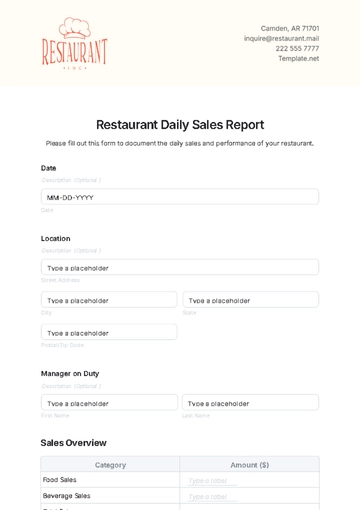Free Sales Quarterly Commission Payout Report

I. INTRODUCTION
At [Your Company Name], we believe in recognizing and rewarding the hard work and dedication of our sales team. This report presents the sales commission payouts for the previous quarter, providing a detailed analysis of our sales team’s performance. It highlights the achievements of our high-performing sales team while also identifying areas where there is potential for improvement.
Our aim is to ensure that our commission structure continues to motivate our sales team and drive our company’s success. We understand that our sales team is a critical part of our organization, and their performance directly impacts our bottom line. Therefore, we are committed to providing them with a fair and transparent commission structure that rewards their efforts and contributions.
In this report, we will present our findings from the previous quarter, discuss our methodology for calculating commission payouts, and provide recommendations for future improvements. We hope that this report will provide valuable insights into our sales commission structure and help us continue to improve and grow.
II. METHODOLOGY
Our commission payouts are composed of three main components: base salary, regular commission, and performance bonus. Each of these components plays a crucial role in the overall compensation of our sales team and is calculated based on specific criteria.
A. Base Salary
The base salary is a fixed amount that is paid to the salesperson regardless of their sales performance. It provides a stable income for the salesperson and forms the foundation of their total compensation package. The base salary is determined by several factors, including:
Position Level: The level of the sales position, such as entry-level, mid-level, or senior-level, can influence the base salary. Higher-level positions typically come with higher base salaries due to the increased responsibilities and skills required.
Industry Standards: We consider the average base salaries for similar positions in our industry when determining our base salaries. This helps us ensure that our compensation is competitive and attractive to potential and current employees.
Location: The cost of living in the location where the salesperson is based can also affect the base salary. We aim to offer a base salary that reflects the living standards of the location to ensure our employees are adequately compensated.
Experience and Skills: The salesperson’s experience, skills, and qualifications are also taken into account. Salespeople with more experience or specialized skills may command a higher base salary.
B. Regular Commission
The regular commission is a variable amount that is calculated based on the salesperson’s performance. It provides an incentive for the salesperson to achieve and exceed their sales targets. The more they sell, the higher their commission. The regular commission is calculated based on:
Sales Volume: The total amount of sales made by the salesperson during the quarter. The higher the sales volume, the higher the commission.
Commission Rate: The agreed-upon percentage of the sales volume that is paid as commission. The commission rate is typically set at the beginning of the fiscal year and remains constant throughout the year.
Sales Targets: The sales targets that have been set for the salesperson. Achieving or exceeding these targets can influence the commission rate. Salespeople who consistently exceed their targets may be eligible for a higher commission rate.
Product or Service Type: The type of product or service sold can also affect the commission. Some products or services may have higher commission rates due to higher profit margins or strategic importance.
C. Performance Bonus
The performance bonus is an additional variable amount that is awarded to the salesperson if they exceed their quarterly sales targets. It provides an extra incentive for exceptional performance and rewards those salespeople who go above and beyond. The performance bonus is determined based on:
Sales Performance: The salesperson’s performance relative to their sales targets. Salespeople who significantly exceed their targets can earn a larger performance bonus.
Strategic Goals: The company’s strategic goals can also influence the performance bonus. For instance, selling a high-priority product or securing a key account might earn the salesperson a larger bonus.
Team Performance: In some cases, the performance of the sales team as a whole can also affect the performance bonus. If the team collectively exceeds its targets, individual salespeople might earn a larger bonus.
III. KEY FINDINGS
The following table showcases the key findings showcasing the performance of the sales team for the previous quarter:
Name | Base Salary | Commission | Performance Bonus | Total Payout |
|---|---|---|---|---|
Jane Miller | $50,000 | $5,000 | $2,000 | $57,000 |
Taylor Jones | $52,000 | $6,000 | $3,000 | $61,000 |
Rodger Smith | $45,000 | $4,500 | $2,500 | $52,000 |
James Brown | $48,000 | $5,500 | $2,500 | $56,000 |
Eve Clarkson | $50,000 | $5,000 | $3,000 | $58,000 |
There is a clear correlation between the level of sales and the size of the commission payout. This indicates that our commission structure is effectively incentivizing our sales team to achieve and exceed their sales targets. Salespeople who sold more products or services generally received higher commission payouts. This correlation underscores the effectiveness of our commission structure in driving sales performance and rewarding salespeople for their efforts.
Taylor Jones had the highest total payout due to outstanding sales performance. This demonstrates the potential for high earnings under our commission structure for salespeople who consistently exceed their sales targets. Taylor’s high total payout is a testament to her exceptional sales skills and dedication. It also highlights the effectiveness of our performance bonus in rewarding exceptional performance.
Rodger Smith had the lowest base salary but managed to increase his total payout through commissions and bonuses. This shows that even salespeople with lower base salaries have the opportunity to significantly increase their earnings through high sales performance. Rodger’s success highlights the effectiveness of our commission and bonus structure in rewarding high performance, and it underscores the importance of providing salespeople with opportunities to earn additional income through commissions and bonuses.
All salespersons managed to achieve their sales targets, granting them all performance bonuses. This is a testament to the effectiveness of our sales training and the dedication of our sales team. It also indicates that our sales targets are well-calibrated - challenging enough to drive performance, but achievable. The achievement of sales targets by all salespersons is a positive sign that our sales team is motivated and capable, and it suggests that our sales training and support systems are effective.
The average total payout for all employees was $56,800. This provides a benchmark for comparing individual salesperson’s earnings and identifying high and low performers. It also gives us a measure of the overall effectiveness of our commission structure. If the average total payout is lower than expected, it may indicate that our commission rates or sales targets need to be adjusted. Conversely, if the average total payout is higher than expected, it may suggest that our sales team is performing well and that our commission structure is effectively motivating and rewarding high performance.
IV. RECOMMENDATIONS
Based on our comprehensive analysis, we propose several recommendations to enhance our sales commission structure and drive sales performance:
A. Sales Training
We recommend providing more comprehensive sales training for those employees with lower base salaries to help them increase their commission potential. This could include training on sales techniques, product knowledge, and customer relationship management.
Sales Techniques: Training on effective sales techniques can help salespeople close deals more effectively and increase their sales. This could include training on negotiation techniques, presentation skills, and relationship building. Additionally, understanding the psychology of sales and the customer’s buying process can also be beneficial.
Product Knowledge: In-depth product knowledge can help salespeople sell more effectively by enabling them to answer customer questions accurately and highlight the benefits of our products. This could include training on product features, benefits, and use cases. Furthermore, understanding the competitive landscape and how our products stand out can also be advantageous.
Customer Relationship Management: Training on customer relationship management can help salespeople build strong relationships with customers, leading to repeat business and higher sales. This could include training on communication skills, customer service, and customer retention strategies. Additionally, understanding customer needs and preferences can help in personalizing the sales approach.
B. Rewarding High Performers
We recommend rewarding higher performing employees with increased base salaries to maintain motivation. This would recognize their contribution to the company and provide them with a greater sense of job security.
Recognition: Recognizing high performers with a higher base salary can boost morale and motivation. It shows that the company values their contributions and is willing to reward their hard work. This recognition can also inspire other employees to improve their performance.
Retention: Offering competitive salaries can help retain top performers in the company. It shows that the company is committed to providing fair compensation and can make the company more attractive to current and potential employees. This can also help in reducing turnover and recruitment costs.
Motivation: A higher base salary can motivate employees to continue performing at a high level. It provides a stable income that employees can rely on, while the potential for commission and bonuses provides an incentive for high performance. This balance can lead to improved job satisfaction and productivity.
C. Sales Targets
We recommend continually reviewing and adjusting sales targets to ensure they remain challenging yet achievable. This would ensure that our sales team continues to be motivated to achieve high sales performance.
Review: Regularly review sales targets to ensure they reflect current market conditions and company goals. This can help ensure that targets are realistic and relevant. It’s also important to consider individual salespeople’s capabilities and performance history when setting targets.
Adjustment: Adjust sales targets as necessary to keep them challenging yet achievable. This can help motivate salespeople to strive for high performance while preventing frustration or burnout from overly aggressive targets. It’s crucial to strike a balance between pushing salespeople to achieve more and setting realistic expectations.
Communication: Clearly communicate any changes in sales targets to the sales team to ensure they understand what is expected of them. This can help ensure that everyone is on the same page and working towards the same goals. Regular feedback and open dialogue can also help in addressing any concerns or issues promptly.
D. Tiered Commission Structure
We recommend considering the possibility of introducing a tiered commission structure to further incentivize high-performing salespeople. This could involve offering higher commission rates for salespeople who consistently exceed their sales targets.
Incentive: A tiered commission structure can provide a strong incentive for salespeople to exceed their sales targets. It rewards high performers with higher commissions, recognizing their efforts and contributions. This can also create a healthy competition among the sales team, driving overall performance.
Reward: It rewards high performers with higher commissions, recognizing their efforts and contributions. This can enhance job satisfaction and reinforce the link between performance and rewards.
Motivation: The potential to earn higher commissions can motivate salespeople to strive for higher sales. It provides a clear and tangible reward for high performance. This can also encourage salespeople to develop and improve their sales skills.
Fairness: A tiered commission structure can also promote fairness by ensuring that high performers are rewarded proportionately for their efforts. This can contribute to a positive work environment and improve employee morale.
Retention: By providing an opportunity for high performers to earn more, a tiered commission structure can help in retaining top talent. It can make the company more attractive to ambitious salespeople and reduce the risk of losing top performers to competitors.
V. CONCLUSION
Our sales team have generally performed well over the last quarter, achieving their sales targets and earning both regular commissions and performance bonuses. Our commission structure has proved successful in motivating our salespeople. However, there are opportunities for improvement to maintain this success going forward.
We are committed to continually reviewing and improving our commission structure to ensure that it continues to drive high sales performance and fair compensation for our sales team. By implementing the recommendations outlined in this report, we believe we can further enhance our sales commission structure and continue to motivate and reward our sales team for their hard work and dedication.
We look forward to seeing continued success from our sales team in the coming quarters and will continue to support them in achieving their sales targets and earning their deserved commissions.
- 100% Customizable, free editor
- Access 1 Million+ Templates, photo’s & graphics
- Download or share as a template
- Click and replace photos, graphics, text, backgrounds
- Resize, crop, AI write & more
- Access advanced editor
Keep your sales team informed and motivated with our Sales Quarterly Commission Payout Report Template! This fully editable and customizable report from Template.net ensures you capture every important detail. With our AI Editor Tool, editing is easier, allowing you to provide a clear and comprehensive report on commission payouts effortlessly!
You may also like
- Sales Report
- Daily Report
- Project Report
- Business Report
- Weekly Report
- Incident Report
- Annual Report
- Report Layout
- Report Design
- Progress Report
- Marketing Report
- Company Report
- Monthly Report
- Audit Report
- Status Report
- School Report
- Reports Hr
- Management Report
- Project Status Report
- Handover Report
- Health And Safety Report
- Restaurant Report
- Construction Report
- Research Report
- Evaluation Report
- Investigation Report
- Employee Report
- Advertising Report
- Weekly Status Report
- Project Management Report
- Finance Report
- Service Report
- Technical Report
- Meeting Report
- Quarterly Report
- Inspection Report
- Medical Report
- Test Report
- Summary Report
- Inventory Report
- Valuation Report
- Operations Report
- Payroll Report
- Training Report
- Job Report
- Case Report
- Performance Report
- Board Report
- Internal Audit Report
- Student Report
- Monthly Management Report
- Small Business Report
- Accident Report
- Call Center Report
- Activity Report
- IT and Software Report
- Internship Report
- Visit Report
- Product Report
- Book Report
- Property Report
- Recruitment Report
- University Report
- Event Report
- SEO Report
- Conference Report
- Narrative Report
- Nursing Home Report
- Preschool Report
- Call Report
- Customer Report
- Employee Incident Report
- Accomplishment Report
- Social Media Report
- Work From Home Report
- Security Report
- Damage Report
- Quality Report
- Internal Report
- Nurse Report
- Real Estate Report
- Hotel Report
- Equipment Report
- Credit Report
- Field Report
- Non Profit Report
- Maintenance Report
- News Report
- Survey Report
- Executive Report
- Law Firm Report
- Advertising Agency Report
- Interior Design Report
- Travel Agency Report
- Stock Report
- Salon Report
- Bug Report
- Workplace Report
- Action Report
- Investor Report
- Cleaning Services Report
- Consulting Report
- Freelancer Report
- Site Visit Report
- Trip Report
- Classroom Observation Report
- Vehicle Report
- Final Report
- Software Report





























